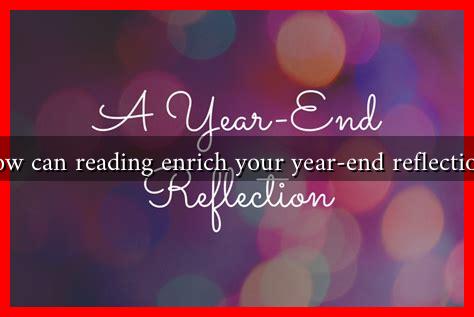-
Table of Contents
How Can Reading Enrich Your Year-End Reflections?
As the year draws to a close, many individuals take the time to reflect on their experiences, achievements, and lessons learned. This practice of year-end reflection can be significantly enriched through the act of reading. Whether it’s literature, self-help books, or biographies, reading can provide insights, inspiration, and a broader perspective that enhances our understanding of ourselves and the world around us. In this article, we will explore how reading can deepen your year-end reflections and offer practical tips to incorporate this enriching activity into your routine.
The Power of Perspective
One of the most profound benefits of reading is its ability to offer new perspectives. Engaging with diverse narratives allows readers to step into the shoes of others, fostering empathy and understanding. This is particularly valuable during year-end reflections, as it encourages individuals to consider their experiences in a broader context.
- Empathy Development: Reading fiction, for instance, can enhance emotional intelligence. A study published in the journal *Science* found that reading literary fiction improves the ability to understand others’ emotions.
- Broader Context: Non-fiction books, especially biographies and historical accounts, can provide context for personal experiences, helping individuals see their challenges and triumphs as part of a larger narrative.
Learning from Others’ Experiences
Books often encapsulate the wisdom gained from years of experience. By reading about the journeys of others, you can glean valuable lessons that may resonate with your own life. This can be particularly useful during year-end reflections, as it allows you to evaluate your own choices and growth.
- Self-Help Books: Titles like *Atomic Habits* by James Clear or *The Gifts of Imperfection* by Brené Brown offer practical advice on personal development and self-acceptance.
- Biographies: Reading about influential figures, such as Nelson Mandela or Marie Curie, can inspire you to overcome obstacles and pursue your passions with renewed vigor.
Enhancing Critical Thinking
Reading encourages critical thinking, a skill that is essential for effective reflection. Engaging with complex texts challenges readers to analyze, synthesize, and evaluate information, which can lead to deeper insights during personal reflection.
- Questioning Assumptions: Books that tackle controversial topics or present multiple viewpoints can prompt readers to question their own beliefs and assumptions.
- Analytical Skills: Engaging with challenging literature can sharpen analytical skills, enabling readers to dissect their own experiences more effectively.
Creating a Reflection Ritual
Incorporating reading into your year-end reflection process can be a transformative experience. Here are some practical steps to create a reflection ritual that includes reading:
- Set Aside Time: Dedicate specific time each week in December to read books that resonate with your experiences or aspirations.
- Choose Wisely: Select books that align with your reflection goals. For instance, if you want to focus on personal growth, consider self-help or motivational literature.
- Journal Your Thoughts: After reading, take time to journal your thoughts and how the material relates to your own life. This can deepen your understanding and retention of the lessons learned.
Conclusion: The Lasting Impact of Reading on Reflection
As you approach the end of the year, consider the profound impact that reading can have on your reflections. By offering new perspectives, sharing valuable lessons, and enhancing critical thinking, reading can transform your understanding of your experiences. Incorporating reading into your year-end ritual not only enriches your reflections but also sets a positive tone for the year ahead. So, pick up a book, immerse yourself in its pages, and let it guide you through a meaningful reflection process.
For more insights on the benefits of reading, you can explore resources like Goodreads or check out articles on Psychology Today.

